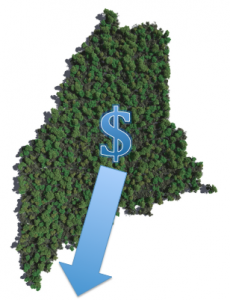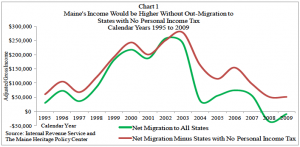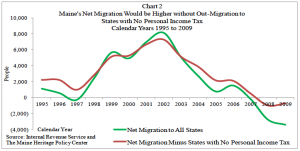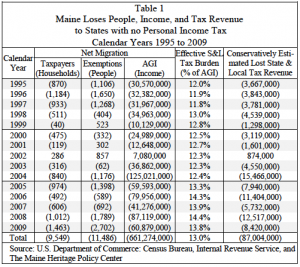Economic Brief: Mainers Flee to States with No Personal Income Tax
 by Scott Moody
by Scott MoodyIn fiscal year (FY) 2009, Maine had the 6th highest tax burden, as a percent of private sector personal income, in the country. The single largest source of Maine’s tax burden comes from the personal income tax which, in FY 2010, constituted 37.3 percent of all state revenue. This large share is driven directly by the top marginal tax rate of 8.5 percent which is the 7th highest in the country.
Of course, this large personal income tax burden comes at an economic price which manifests itself, in part, through the out-migration of people and income to greener pastures. This study examines Maine’s net migration to states without a personal income tax from 1995 (the first year of available data) to 2009 (the latest year of available data) based on data from the Internal Revenue Service.
Analysis of this migration data shows that Maine has lost people and their income to the nine states that have no personal income tax for nearly every year in this time-period. Cumulatively, as shown in Table 1, Maine has lost 11,486 people and $661,274,000 in income. The lost income is a conservative estimate because it does not account for the compounding of in-come over time and the multipliers of the income as it ripples through the economy.
Additionally, this lost income has consequences for Maine’s state and local governments through reduced tax receipts. Table 1 shows that Maine’s state and local governments have, conservatively, lost $87,004,000 over this time-period.
The first step in the long road back to economic recovery is to give these out-migrants a reason to stay or return home. This evidence strongly suggests that eliminating the personal income tax would help level-the-playing-field and give Maine a fighting chance to convince residents to stay put. It would also help Maine’s small businesses and create new jobs.
Voting with Their Feet
Chart 1 and Table 1 shows how much income, as measured by taxpayer’s Adjusted Gross Income, that Maine has lost between 1995 to 2009 to states with no personal income tax. On average, every year $44,085,000 in income leaves the state to never re-turn. Chart 1 shows that not only would Maine’s net in-migration of income be higher than it was for nearly every year over this time-period, but that the last two years of net income losses would have remained positive.

Chart 2 and Table 1 shows how many people, as measured by taxpayer’s claimed exemptions, that Maine has lost between 1995 to 2009 to states with no personal income tax. On aver-age, 776 people leave the state to never return. Chart 1 shows that Maine’s net in-migration would have been higher than it was for nearly every year over this time-period.

As a result of this out-migration of people and their income, Maine’s state and local governments have also suffered through reduced tax receipts. Table 1 shows that Maine’s state and local governments have, conservatively, lost $87,004,000 in income taxes, sales taxes, property taxes, etc. over this time-period.

Keep in mind that all of the income and tax loss estimates are based on the net out-flow of income in only the year of migration. However, this income is lost forever which means the compounded losses are significantly larger—$1 lost 15 years ago is worth $15 compounded in every year. Also, these income and tax loss estimates do factor in the lost multipliers this money would have had on Maine’s economy as it ripples through the economy—$1 spent may eventually become $3 or $4 in total economic activity. As such, these are very conservative estimates.
Conclusion
Opponents of eliminating Maine’s personal income tax will, quite predictably, lament the loss of state tax revenue. However, this analysis clearly shows that the loss revenue is significantly lower than commonly assumed. The economic benefits of stemming, or even reversing, the out-flow of people and their income to states with no personal income tax would be a boon to the economy.
On a static basis, eliminating Maine’s personal income tax, in FY 2010, would cost the state approximately $1.3 billion. On a dynamic basis, which would factor in things like reversing out-migration and the creation of new businesses and jobs, the loss in state revenue would be significantly lower. This study only highlights the economic benefits of stemming Maine’s out-migration to states with no personal income tax.
In the near future, a more comprehensive dynamic tax analysis will be performed to get a fuller accounting of the positive bene-fits of eliminating Maine’s personal income tax on taxpayers, the economy, and state and local government. Stay tuned.
J. Scott Moody is the Chief Economist at the Maine Heritage Policy Center, the parent organization of The Maine Wire. He can be reach at jsmoody@mainepolicy.org.
http://www.themainewire.com/2012/05/economic-brief-mainers-flee-states-personal-income-tax/
![[Most Recent Quotes from www.kitco.com]](http://www.kitconet.com/images/sp_en_8.gif)
No comments:
Post a Comment